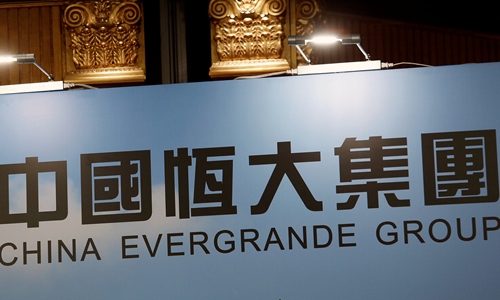Evergrande ‘not too big to fail’: Chinese analyst responds to foreign hype
China-bashers lack professionalism in hyping single case

Evergrande Group. Photo: VCG
As discussion about Evergrande Group has continued to ferment, the Chinese real estate giant said it will pay interest to professional investors starting on Thursday for corporate bonds issued in 2020, with interest paid at 58 yuan ($8.98), tax included, per lot with a par value of 1,000 yuan.Evergrande's shares closed 17.62 percent higher at HK$2.67 ($0.34) on the Hong Kong market on Thursday.
Analysts said that negative talk about China's economic prospects based on Evergrande's single case show a lack of understanding of China's development model, and also reflects a lack of professionalism.
"Evergrande's crisis is not unexpected, as its development has been influenced by hoarding capital and splashing into unrelated businesses, such as bottled water and new-energy vehicles," Cong Yi, a professor at the Tianjin University of Finance and Economics, told the Global Times on Thursday.
Cong said that the market has overreacted to Evergrande's debt problem.
"The central government guided the direction of the domestic property market early in 2016: Houses are for people to live in, not for people to speculate on. Hence, the exposure of Evergrande's crisis underscores the authorities' firm determination to regulate a rapidly expanding sector, whose development relies on piles of debt," he said.
Western investors, such as analysts like Jim Chanos, said that the collapse of Evergrande Group could prove to be "far worse" for investors in China than a "Lehman-type situation," according to media reports.
Those who badmouth Chinese economic prospects because of Evergrande's single case do not understand China's development model, Cong pointed out. "China's future economic development relies on innovation and the real economy, rather than the short-term booster of the property sector," he said.
At the 19th National Congress of the Communist Party of China, the country sent a clear signal that it will put growth quality and efficiency before speed as it enters a new development era, with a focus on the upgrading of the economic structure and innovation.
Analysts also said that groundless slander against the Chinese economy has become the main theme of the Western media.
For example, Bloomberg published a news article titled "China's central bank injects 120 billion yuan ($18.6 billion) into the banking system after concern over a debt crisis at Evergrande roiled global markets" as if the Chinese government was to bail out the company, analysts noted.
"It is either unprofessional or eye-catching, as [regulatory monetary operations] have nothing to do with Evergrande's case," an analyst based in Shanghai who works at an investment bank told the Global Times on Thursday, on condition of anonymity.
He added that foreign media outlets like to hype such topics, so as to have an impact on the capital market or bond market, to prove the media reports are "professional."
The current focus is mostly on the overdue payments for its high-yield wealth management products, Cong said, noting that the responsibility should be shouldered by the group itself, and it's too early to talk about a government bailout.
"Evergrande is not too big to fail. In addition, a government bailout is not in line with the central government's principles in handling financial volatility over recent years," Cong noted.
During a late night conference on Wednesday, Evergrande's chairman Xu Jiayin said that the company will guarantee the quality and smooth delivery of the buildings of Evergrande's projects, saying it is the company's obligation and responsibility.
"There have been many unverified reports about Evergrande's restructuring and takeover by local governments. But it is in line with expectations that local governments will take over," Yan Yuejin, research director at Shanghai-based E-house China R&D Institute, told the Global Times. "Evergrande has a large number of projects. If these are not actively disposed of in various places, it is indeed prone to risks."
It is expected that various policies against Evergrande will emerge, which could also be the starting point for fine-tuning policies related to real estate, Yan added.


